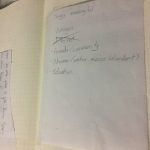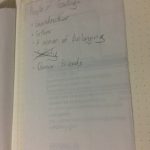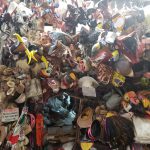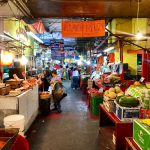Being abroad is an opportunity to learn so much about the world we live in, and while I haven’t yet talked much about what I’ve learned with my program’s workshops and partners, I’d like to use this space to talk about how I’ve learned. What I’ve learned comes next post and ho’ mama, it’ll be a big one! My trip to Mexico City is through one of the University of Washington’s “faculty led” programs. My program director Anu and her staff Panch, Rafa, and Sasha have designed this trip with intentional placement of lecture locations and more importantly, a wide variety of experts in every topic. While some of Anu’s partners use standard lecturing, some have gone above and beyond with the most wild forms of pedagogy. Most of which involved me crying in the end.
Just this week with an expert on migration, Dani used what he called “the pedagogy of the oppressed.” It began simply, as most do, with us writing a couple things. It was two lists of five items each, the first being things most important to us, and the other being people and ideas in the same category. These were my lists to start:
Okay, still simple. At this point in the workshop, we were all still laughing and having a fun time getting to know Dani a bit more. Then came the imaginary scenario, which consisted of three stages. We all sat down and closed our eyes to listen to Dani speak a scenario of a calm night at home.
“You have your nighttime cup of tea, read a book maybe, all is calm. You go to look at the tv and drop in horror to realize that your city has just been bombed. The United States has been attacked and you need to leave. You grab what you can and leave your home. At this point cross off two items off either list. Hurry, you have no time to think, just do!”
He ran around the room ushering us to cross our items as quickly as possible making it hard to think. It was a bit of a shock, especially when I was feeling so immersed. I frantically glanced at my lists taking away internet and safety. Feeling a little startled but still okay, we continued to stage two.
“You begin walking in search of a new home, avoiding conflict and strife. After walking for many weeks, your feet sore, hungry, maybe not having showered in a while (I was thinking to myself how I kept water access in my lists so I was good, just imagining walking with my family). Finally, you arrive at the border to Mexico, thousands of people waiting to get through. Please all of you, make two lines side by side facing forward.”
The ten of us students did as he asked, unsure of what was to follow. Dani then got up to stand in front of us all. He said something in Spanish at this point (I don’t know Spanish) but I could tell he was acting as a customs officer. “Papeles! Papeles!” The officer gestured to our lists in hand, which I guess acted as entrance forms. He began working his way down the line, looking at each list. I was near the back. “Yoooouuuuu… (*looks at papers*), you can go in. Welcome to Mexico! And you, hmmm, family huh? You can’t go in, turn back to the city being bombed behind you, you’re dead.” Us in the back were shocked at what we saw, some breaking out in emotion as they found their supposed fate. He claimed one could go in if they did him a “favor” with a disgusting grin and look in his eyes. “I’ll let you think about the decision and come back.” Finally, he came to me. I was terrified. He takes my papers by force, looking at both lists. “You can come in, but only if you have to cross out everything on these lists, only you get in.” My heart skipped a beat. It was on the next beat when a quiet “no” found its way out. “Are you sure? You will die in that city being bombed behind you.” Still unable to think, a more muffled and nervous “no” tumbled across my tongue. “Alright, turn around. You’re dead.” After a few seconds of shell shock I thought to myself, I couldn’t leave my family, my friends, everything that made me feel like me and then some. I couldn’t leave it behind. I’d rather have died than lost it all for a chance to continue. It was at that point I realized, I likely would have committed suicide if I had gone through. Having gotten through depression earlier this year, I knew it would resurface far worse. Either way I would have died…
I was a ghost in a shell for the rest of that presentation. A third stage had a happier ending about rebuilding a future for those who got through but I was too distraught to fully participate. Dani took us through just an inkling of the emotion and struggle that comes with migration. I was in tears for over an hour, far after the exercise was over and well into the lecture section. This was some of the most powerful learning I’ve had on this trip.
Another workshop was on gender and violence. After a lecture about the horror of Mexico’s feminicides, we were all asked to split into two groups, “men” and “women.” There were more women than men so we improvised. Each group had six people (some staff joined in) and were given simple rules for the exercise. The “women” could not talk. They had to sit down and try to swap seats with each other in the circle of chairs. They had to use eyes to communicate. I was placed in the “men” group. We had to prevent the “women” from standing up by any means necessary. That was our only rule. You could tell by the discomfort expressed by all of our faces that no one wanted to grab them by the shoulders to hold them down. Instead, we rushed to block them by crowding the middle of the circle but they could still swap side by side. So we started blocking their vision. I took my raincoat and held it in front of my colleague Maana. After a minute, she began to look frustrated and upset, not being able to yell at me either. Every passing second built my guilt up higher and higher, pillar by pillar into a mental Burj Khalifa. The exercise ended, “men” being victorious with their obvious advantage in the rules. The prize was nothing.
It was time for a debrief and our instructor, Marcela asked a very simple question. “Why didn’t you work together?” Then it hit me, there were so many possible workarounds. “Crouching isn’t standing!” I thought. We weren’t inherently against each other or anything like that. I was wrong, there was a prize. The Burj Khalifa of Guilt becoming a tower so tall that it pierced the stratosphere, a sight to surely see. After the debrief, I walked out and just sat alone. It was so easy to just stop the “women” with our advantage that we didn’t think to help them. We just wanted to win so to speak. The metaphor to society was clear yet also the most foul, disgusting thought you could come to. Far more powerful than just saying that society has a patriarchy.
There’s one more practice in pedagogy I’d like to share. Don’t worry, I realize this is long but this one is far simpler than either of the previous. We spent a day shopping! We left at ten to visit La Mercede, the largest public market in the city spanning many warehouses full of small stands. They sold everything from fruit to anti-witchcraft soap. It was crowded, smelly, unsanitary in some places like the warehouse full of animal cages filled with pigeons, chickens, puppies and chickens. You could smell the animal rights abuse. We rushed from section to section to section following our group leader, Rafa. The ground was cracked in some places causing me to trip several times. The day had no lecture, just observing our surroundings.
After a few hours at La Merced, we left to for a second unannounced market located in Polanco. Polanco is one of the richest neighborhoods in Mexico, containing the most expensive strip in all Latin America. After a short walk, we arrived at El Palacio de Hierro, a single store designed to look like a mall holding stalls for each and every high end brand like Louis Vuitton and Coach. It was built with the intention of being the very best for the very highest class. Upon going inside, I could feel the inequality as a pit in my gut. It was like walking inside a diamond with how fancy it was set up. What was worse was the whole area felt like home in Seattle. I found myself split between wanting to buy things and protesting the blatant waste and classism. They had a TV in the ceiling acting as a sky or stained glass window depending on the time! Shame? Guilt? No, it was pure disgust that I felt in the end. I couldn’t stand being in the area any longer. I was glad to leave and never return.
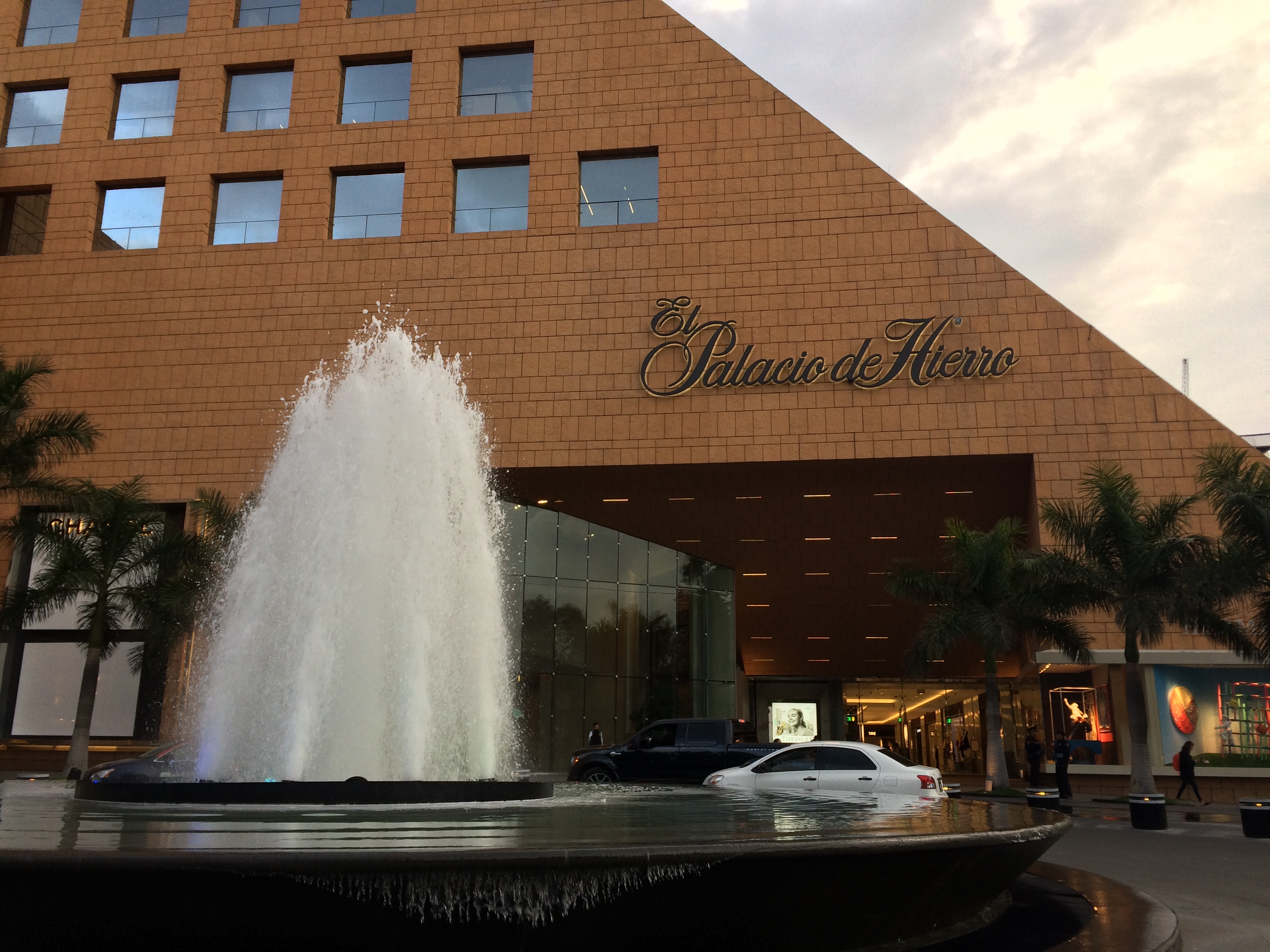
Each of these methods in teaching have something in common, feeling. So often in the classroom we have facts and theories spat at us from a distance. How often does a teacher let us learn through experience or emotion? It may be more difficult but the power of these more personal pedagogies is easily worth the trouble. These lessons may be the most painful to experience, but they are easily my favorite moments in my time abroad thus far.

